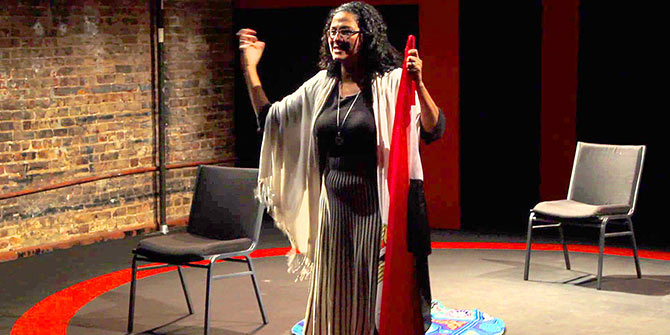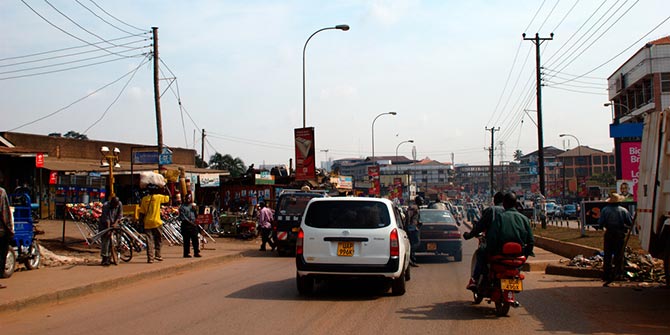LSE’s Rochelle Burgess acclaims the latest book by Hakan Seckinelgin, International Security, Conflict and Gender: ‘HIV is another war’ as a must-read. This review originally appeared on Global Policy.
HIV/AIDS specialist are often faced with a derivative of the following question: ‘Why do people keep contracting HIV?’ As a specialist in the field, my reply often begins with ‘because AIDS is actually more about the realities of life that sometimes play out in ways that make AIDS an inescapable reality’. This is a bleak response as best, but well supported by strings of evidence that highlight how social ills, rather than behaviours alone, contribute to on-going spread of the disease. As part of my defence, I also include arguments outlining the distance between HIV programme ‘ideals’ and ‘local’ realities – created by the knowledge paradigms and assumptions that underpin many ‘failed’ programmes. For some time, there were a minority of voices shouting such things into the wind—a crucial example found in bodies of work including Catherine Campbell’s “Letting them Die” which uncovers the realities of employing decontextualised western approaches to prevention of HIV in South Africa.
Over time, the value of local context specific knowledge to global HIV/AIDS policy debates has been recognised (at least, in rhetoric). The recent inclusion of civil society forums at the 2011 UN General Assembly on AIDS, and the selection of the theme of ‘knowing practices’ to headline the forthcoming Association for Social Science and Humanities in HIV/AIDS conference this June both articulate a growing willingness to engage with issues of ‘local knowledge’ as part of effective pandemic response.
Hakan Seckinelgin’s newest work International Security, Conflict and Gender: ‘HIV is another war’ makes an immaculate and welcome contribution to debates of ‘Whose reality, and whose knowledge counts?’ in structuring responses to the pandemic. Although the book’s title gives little indication of this to the reader (perhaps, the book’s only flaw), it remains a deeply engaging and often fearless champion of these aims. Seckinelgin zeros in on the knowledge base currently supporting ‘securitisation of HIV’ debates, and challenges the resultant claims made about relationships between conflict, international security and HIV/AIDS.
Focusing on the context of post-conflict Burundi, accounts of communities marked by conflict become the cornerstone of a new framework for understanding the conflict and HIV relationship. Driven by an analytical strategy described as ‘thinking along’ (pg.17) participant accounts, the book renders what current evidence claims to know about issues of conflict and HIV (or, as he presents in chapter six, what we claim to ‘not know’) as, moot. Instead, Seckinelgin emerges with a much needed re-conceptualisation of the links between conflict, gendered relations and HIV, now presented as inexorable factors that weave together to shape people’s lives. We are forced to, as he argues in chapter one “…change the perspective on the discussion about HIV and conflict” (p.35). His discoveries of what actually matters in this arena emerges in stark contrast to the current discourses that often prioritise military and armed groups as primary areas of concern.
The introduction seeks to locate the current research into the broader paradigm of international policy and evidence debates on the securitization of HIV. A highlight resides in reflexive accounts about the nature of working with sensitive data, assumptions that pervade this process and our responsibilities as researchers in this vein. Readers interested in the emancipatory potential of research will find solace in the methodological choices driving this work. The importance of local buy in, and ensuring local relevance fuel the author’s effort to elevate the voices of his participants to a level where they can be finally ‘heard’ at the policy level.
Chapter one presents the history of Burundi: focusing on conflict and HIV/AIDS. Its primary focus explores a group interview, which is used to flush out what Seckinelgin refers to as the ‘contours’ of peoples’ conflict: how conflict, post-conflict Disarmament Demobilisation and Reintegration (DDR) are locally experienced. These interviews, rather than the discourses currently driving the field as outlined in the introduction, identify the “pathways which matter for the relationship between HIV/AIDS and conflict that need[ed]to be considered….relevant because it impacts the life of individuals and communities both during and after the conflict” (p 39).
Subsequent chapters emerge as some of the most difficult aspects of the book to digest – not from an intellectual or theoretical position, as Seckinelgin builds his arguments with astounding clarity – but vis a vis their appeal to one’s basic notion of human dignity. There is no attempt to shy away from the staggering reality created by the gendered norms and values that disempower both women and men, and, how the contexts of conflict modified these values in ways that sometimes only further exacerbated HIV related risks. For example –patrilineal norms about male protection may have helped protect some women (such as those who joined in with rebel forces), but simultaneously created problems for others – such as single and widowed women who were made vulnerable to rape and abuse in the absence of male protection. These excerpts emerge as a hard, but necessary pill to swallow for those who study or design women-centred policies.
Chapter four solidifies the intersections of gender and HIV in people’s lives during and post conflict. HIV emerges as a hitherto neglected space of concern for many ex-combatants, and displays how HIV programming delivered within demobilising camps achieved limited impacts given their inability to engage with the realities of broader psychosocial needs facing the de-mobilised combatants. Community re-integration is discussed in chapter five, where the realities facing groups of women who self-demobilised are uncovered as one of the factors hindering re-integration in Burundi.
By the end of chapter six and seven, questions about the relevance of Seckinelgin’s current efforts to the broader securitisation debate are nullified, in light of his deconstruction of a 2007 systematic review of ‘evidence’ in the field. Under his critical powers, the knowledge claims that assert ‘insufficient evidence’ to confirm a relationship between conflict and the spread of HIV are exposed as tenuous- at best. This, in combination with preceding chapters, demands our reflection on policy level value judgments of evidence paradigms, and the moral implications of informing international policy decisions on incomplete evidence bases. Chapter 8 focuses on everyday community engagement with HIV, highlighting neglected dimensions of agency among groups as they work within the boundaries created by limited international discourses.
The conclusion presents as a space for dissuading his critics, particularly in sections where the adequacy of current efforts to expand the securitisation approach vis a vis attention to gender issues, or adopt a ‘human security’ approach are questioned. Nonetheless, it hammers home the need to move policy planning efforts closer to the ground, and to sit face to face with people’s hardships as part of policy endeavours.
International Security, Conflict and Gender makes a successful follow-up to Seckinelgin’s 2008 earlier work explored disjuncture between global governance structures and local realities of NGOs working in HIV. In the face of this text, policy makers should (hopefully) find themselves disrupted in efforts to adhere to current patterns of planning around HIV in issues of conflict. The book is a must read for social policy actors, and demands recognition of the importance of including the knowledge of those who are targets of policy endeavours as part of any and every policy.
International Security, Conflict and Gender: ‘HIV is another war’ by Hakan Seckinelgin London: Routledge, 2012. 204 pp £80 (hardcover) 978 0415615709






